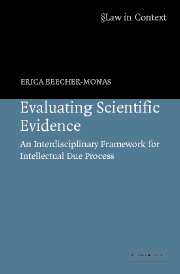Book contents
- Frontmatter
- Contents
- Acknowledgments
- Evaluating Scientific Evidence
- Introduction
- 1 Triers of science
- 2 What is intellectual due process?
- 3 A framework of analysis
- 4 Toxic torts and the causation conundrum
- 5 Criminal identification evidence
- 6 Future dangerousness testimony: The epistemology of prediction
- 7 Barefoot or Daubert? A cognitive perspective on vetting future dangerousness testimony
- 8 Future dangerousness and sexual offenders
- 9 Models of rationality: Evaluating social psychology
- 10 Evaluating battered woman syndrome
- Conclusion
- Index
- The Law in Context Series
3 - A framework of analysis
Published online by Cambridge University Press: 04 December 2009
- Frontmatter
- Contents
- Acknowledgments
- Evaluating Scientific Evidence
- Introduction
- 1 Triers of science
- 2 What is intellectual due process?
- 3 A framework of analysis
- 4 Toxic torts and the causation conundrum
- 5 Criminal identification evidence
- 6 Future dangerousness testimony: The epistemology of prediction
- 7 Barefoot or Daubert? A cognitive perspective on vetting future dangerousness testimony
- 8 Future dangerousness and sexual offenders
- 9 Models of rationality: Evaluating social psychology
- 10 Evaluating battered woman syndrome
- Conclusion
- Index
- The Law in Context Series
Summary
To function as gatekeepers, judges must decide whether the scientific expert's testimony is valid scientific knowledge, which Daubert explained as knowledge grounded in scientific method. Although most of us have heard the term “scientific method,” expecting judges to decide whether expert testimony has been derived from its criteria – without more guidance – seems a stretch. As commonly understood, scientific method means taking an idea about how things work, framing it in a testable hypothesis, and testing the hypothesis to see if it holds true, all measured and expressed in mathematical (i.e., probabilistic) terms. However, despite the U.S. Supreme Court's reference to the scientific method as the cornerstone of scientific knowledge, its existence is debatable. First, there is no monolithic scientific method. Karl Popper, the preeminent philosopher of science cited by the Daubert Court, thoroughly debunked any such notion. There is no all-inclusive set of rules that can be applied to science to determine its validity. Differences arise among scientists in different disciplines, and even within the same discipline, with respect to the amount of evidence that is needed to support a theory. Instead, there are many methods and many procedures. The only essential ingredient for good science – and, hence, the only overarching method – is that science must be open to critique and revision.
Purportedly, the scientific method is a way to ensure objectivity; however, the scientific method is no guarantee of objectivity.
- Type
- Chapter
- Information
- Evaluating Scientific EvidenceAn Interdisciplinary Framework for Intellectual Due Process, pp. 36 - 56Publisher: Cambridge University PressPrint publication year: 2006



